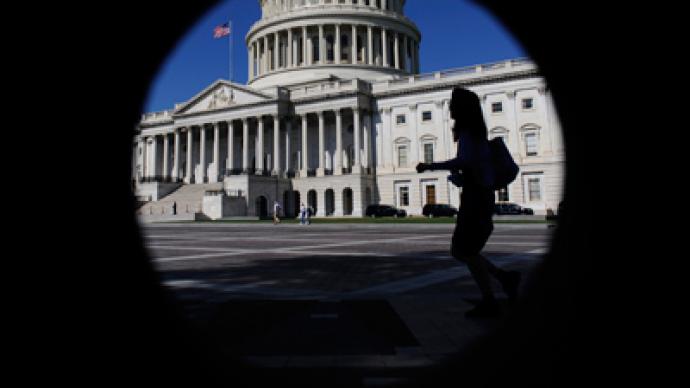Privacy bill’s dark irony: Government would be allowed to read emails without needing a warrant

An attempt at overhauling online privacy laws has been re-written on Capitol Hill to comply with requests from law enforcement so that emails and other personal communications can be more easily obtained by the police, CNET reports.
According to an article published on Tuesday by CNET chief political correspondent Declan McCullagh, the US Senate is expected to weigh in during the coming days on a proposal that would make obtaining private Internet records even more effortless for authorities. McCullagh writes that lawmakers will have a chance as early as next week to approve changes to the Electronic Communications Privacy Act of 1986 (ECPA) that would mean police officers and federal investigators won’t need a search warrant to access the emails of Americans. Instead, McCullagh reports, only a subpoena authorized without the same degree of probable cause will be required to obtain intimate details about anyone’s personal correspondence.In what is perhaps the most baffling part of the proposal, the measure comes as part of a re-write to the Electronic Communications Privacy Act Amendments Act of 2011, an attempt from Senator Patrick Leahy (D-Vermont) that aimed only a year ago to increase protections for the personal computer records of US citizens. That legislation was shelved without being approved after the National Sheriffs' Association and the National District Attorneys' Association asked Congress to "reconsider acting" on the bill until a "review of its impact on law enforcement investigations is conducted." Now that the police have lobbied successfully to shut-down safeguards to protect what was left of America’s online privacies, McCullagh writes that the ECPA Amendments Act has been revamped by Sen. Leahy to let nearly two dozen federal agencies have an easier time at obtaining computer records.“It's really perfect democrat politics,” Boston, Massachusetts-based privacy advocate Kade Crockford writes on Twitter. “A privacy bill in name that actually strips us of our privacy in effect.”Should the legislation be approved, says McCullagh, Congress will grant “warrantless access to Americans' electronic correspondence to over 22 federal agencies,” including the Securities and Exchange Commission, the Federal Reserve, the Federal Trade Commission and the Federal Communications Commission, essentially meaning Ben Bernanke would only need a magistrate’s signature to mop up the contents of any person’s inbox if that’s what the Fed chairman desires.“Only a subpoena is required,” writes McCullagh, “not a search warrant signed by a judge based on probable cause.”The Electronic Frontier Foundation (EFF), who has adamantly opposed similar attempts at privacy-striking legislation in the past, explains on their website that subpoenas “are issued under a much lower standard than the probable cause standard used for search warrants.”“A subpoena can be used so long as there is any reasonable possibility that the materials or testimony sought will produce information relevant to the general subject of the investigation,” says the EFF.Under the Foreign Intelligence Surveillance Act (FISA) and its 2008 Amendments, the government already has been given the authority to eavesdrop on the online and telephone conversations of Americans as long as at least one person involved is suspected of being outside of the United States. The US House of Representatives voted to reauthorized the FISA Amendments Act (FAA) of 2008 earlier this year, despite even the top members of the congressional intelligence committee being left in the dark about how the National Security Agency uses those powers and who is targeted. “All that Senator [Mark] Udall (D-CO) and I are asking for is a ballpark estimate of how many Americans have been monitored under this law, and it is disappointing that the Inspectors General cannot provide it,” Sen. Ron Wyden (D-OR) told Wired’s Danger Room back in June. “If no one will even estimate how many Americans have had their communications collected under this law then it is all the more important that Congress act to close the ‘back door searches’ loophole, to keep the government from searching for Americans’ phone calls and emails without a warrant.”Thomas Drake, a former NSA staffer who was prosecuted for blowing the whistle on internal mismanagement within the agency, writes on Twitter that Leahy’s proposal according to how it is portrayed by McCullagh exemplifies “subversion” of the US Constitution and effectively “guts” the Fourth Amendment should it be signed into law. As reported by CNET, passing Leahy’s latest proposal will permit “state and local law enforcement to warrantlessly access Americans' correspondence stored on systems not offered ‘to the public,’ including university networks.” It also “Authorizes any law enforcement agency to access accounts without a warrant – or subsequent court review – if they claim ‘emergency’ situations exist.”Under the current text of the Electronic Communications Privacy Act, private information held on remote ‘cloud’ servers not owned by the sender or recipient can be obtained by law enforcement agencies under an easy-to-get court order, an issue that has led to a multitude of privacy advocated to lobby for an update in the nearly 30 years since the bill was first passed. For McCullagh, he says, “At the moment, Internet users enjoy more privacy rights if they store data on their hard drives or under their mattresses, a legal hiccup that the companies fear could slow the shift to cloud-based services unless the law is changed to be more privacy-protective.”“A key piece that we need to realize here is that, my emails, the emails that I send to my friends…I don’t actually possess them,” Kade Crockford told RT when she spoke about the ECPA earlier this year. “If I use Google or Gmail to send emails, its Google or Gmail that possess my emails, so the government doesn’t even have to go to me. It can completely ignore me if it wants information about what I’m talking about or who I’m talking to and go to Google instead.”Despite easy access for authorities, though, Leahy’s changes could make accessing someone’s emails an affair that lends to even less roadblocks.“The whole point of ECPA reform was to increase digital privacy,” Trevor Timm from the EFF tweets on Tuesday. “Now Congress wants to use the bill to make it worse.”Text of the updated legislation has not been made publicly available yet but has been confirmed to CNET by persons participating in Capitol Hill meetings on the topic.















